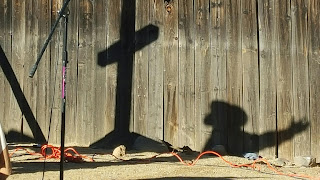Fruitful Soil (Luke 8:1-39)
Journey with Jesus to the Cross (Thursday, March 17)
Read Luke 8:1-39
On March 5, 1976, Donna and I were two sixteen-year-old kids staring at each other over ice cream at Robin Hood’s Ice Cream Shoppe in Lake Havasu City, Arizona. It was our first official date. Four years later we were married, and the following year we began a lifetime of ministry together.
Our first assignment was a dream situation: we were ministers of youth and worship at a thriving church in Pismo Beach, California. We loved everything about it. People thought we were crazy when we left after four years to finish our education, and to become the pastors of a country church in Dillman, Indiana.
Whenever I read the parable of the sower and the seed, I fondly recall that country church where we enjoyed four fantastic years of ministry. Why they were willing to embrace a 25-year-old, guitar-playing, long-haired preacher from California is a mystery to me. But they did, and we’ve never forgotten their love and generosity.
Raised in Arizona and educated in California, I knew nothing about farming or farmers. And now here I was, a country preacher. When I apologized for my agricultural ignorance, one old-timer said to me, “Preacher, don’t you worry about the farmin’; you just keep on preachin’ the Bible, and we’ll get along just fine.” It was good advice.
The first year we were there we had an outdoor church service for some kind of special event. Since cornfields surrounded us, I chose this parable as my text. The placards I made as object lessons are probably stashed away somewhere in my files: Hard, Stony, Thorny, Fertile.
As we have followed his unfolding ministry in Luke’s gospel, we’ve seen abundant evidence of the truth of Jesus’ parable. Often it’s been in rather unexpected ways. Religious people have appeared hard-hearted: Jesus’ townsfolk in Nazareth tried to kill him; religious leaders plotted Jesus’ death because he healed on the Sabbath; and of course, Simon the Pharisee was Jesus’ inhospitable host. They were not interested in the seed Jesus was sowing.
On the other hand, we have seen some surprisingly fertile soil: the Gentile centurion trusted Jesus to heal from far away; Levi left a lucrative tax business to follow Jesus; the forgiven woman tearfully and gratefully washed Jesus’ feet; and in a story almost equally shocking in that culture, women of means financially supported Jesus’ ministry and traveled with him as disciples.
Perhaps the point of Jesus’ sown seed story is that one never really knows which seed will most bear fruit – you just do your best and trust God for the rest. Midwestern farmers, who rely on rain for irrigation, understand this instinctively. You can only do so much. The rest is up to God. And God has an uncanny way of bringing fruitfulness out of the most unlikely places.
Many years have passed since I preached that sermon in the Indiana cornfields. Much to my surprise and delight, it appears my life has gone full circle. My country preacher days are long gone; instead, I'm a cowboy preacher teaching the Bible at a western saloon. Even better, I get to do it outdoors every Sunday. Better yet, the evidence of God's blessing and fruitfulness is told in countless stories around our church family. And best of all, the girl with ice cream on her lips is still staring back at me. Don’t know if it’s been a hundredfold yield, but it’s been a pretty good run. I wouldn’t have it any other way.
“Lord, help me to ‘hear your word, hold it fast in an honest and good heart, and patiently wait to bear fruit’” (Luke 8:15).
